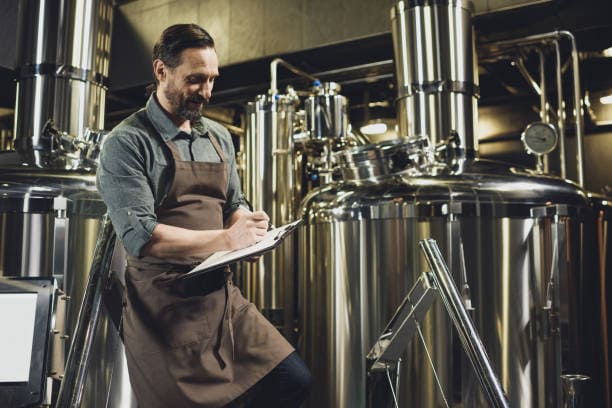Opening a brewery in Australia requires multiple licences including federal excise registration, state liquor licences, and proper insurance coverage to meet legal requirements and protect your investment.
Australia's craft brewing industry has exploded in recent years, with hundreds of new breweries opening across the country. However, navigating the legal requirements brewery owners must meet can be complex and overwhelming. From federal excise obligations to state-based liquor licensing, understanding what permits and protections you need is crucial before you start brewing your first batch.
The licensing landscape for breweries involves multiple layers of government regulation, each with specific requirements and potential penalties for non-compliance. Whether you're planning a traditional brewery with your own facility or considering contract brewing arrangements, getting the legal framework right from the start can save you thousands of dollars and prevent serious regulatory issues down the track.
Federal Licensing Requirements
At the federal level, any business producing alcohol in Australia must register with the Australian Taxation Office (ATO) for excise purposes. This is perhaps the most critical licence for brewery operations, as alcohol excise represents a significant portion of the federal government's revenue.
Excise Producer Licence
Every brewery must obtain an excise producer licence from the ATO before commencing alcohol production.[1] This licence allows you to produce alcoholic beverages and manage your excise obligations. The application process involves demonstrating your business structure, production capacity, and compliance systems.
Important Insight
The federal excise rebate can provide up to $350,000 annually for eligible producers, making proper licensing essential for maximising your brewery's profitability.[2]
A crucial component of excise licensing is establishing a bonded area - a secure, ATO-registered location where you can store alcohol before excise duty is paid.[3] Without a bonded area, you'll be liable for full excise payments upfront, which can significantly impact cash flow for new breweries.
Contract Brewing Considerations
If you're planning to use contract brewing arrangements, the licensing requirements become more nuanced. Contract brewers can typically rely on the manufacturing licence of the brewery producing their beer, but this creates important financial implications for excise obligations.
Without your own ATO-registered bonded area, you'll pay excise upfront and may miss out on the federal excise rebate that can be worth hundreds of thousands of dollars annually. This makes contract brewing potentially more expensive in the long term, despite lower initial setup costs.
State and Territory Liquor Licensing
Liquor licensing in Australia is managed at the state and territory level, with each jurisdiction having its own requirements and application processes. Even contract brewers need to obtain appropriate liquor licences tied to a physical location.
Producer/Wholesaler Licences
Most states require breweries to hold a producer licence or wholesaler licence depending on your business model. These licences allow you to manufacture alcoholic beverages and sell them to retailers, distributors, or directly to consumers in some cases.
The key requirement across all states is that liquor licences must be tied to a specific 'licensed premises' – a physical location that the licence applies to.[4] This can be as formal as a commercial brewery facility or as informal as a home office for contract brewers, but you must legally specify a location.
Many brewery owners underestimate the insurance implications of their licensing choices. Your coverage needs change significantly based on whether you operate your own facility or use contract brewing arrangements.
State-Specific Requirements
Each state has different application processes, fees, and ongoing compliance requirements for brewery licences:
- New South Wales: Requires a producer/wholesaler licence through Liquor & Gaming NSW
- Victoria: Producer's licence through the Victorian Commission for Gambling and Liquor Regulation
- Queensland: Commercial producer licence via the Office of Liquor and Gaming Regulation
- Western Australia: Producer's licence through the Department of Local Government, Sport and Cultural Industries
- South Australia: Producer licence from Consumer and Business Services
- Tasmania: Producer licence through the Liquor Licensing Board
Additional Permits and Registrations
Beyond the primary alcohol licences, breweries need several other permits and registrations to operate legally in Australia.
Business Registration Requirements
Standard business registrations include obtaining an Australian Business Number (ABN), registering for Goods and Services Tax (GST), and completing any required company registrations with the Australian Securities and Investments Commission (ASIC).
Many breweries also need to register for Pay As You Go (PAYG) withholding if they employ staff, and ensure compliance with workplace health and safety regulations in their state or territory.
Food Safety and Planning Permits
Breweries are food production facilities and must comply with relevant food safety standards.[5] This typically involves registering with your local council as a food business and implementing a food safety program compliant with Food Standards Australia New Zealand requirements.
If you're establishing a physical brewery location, you'll also need appropriate planning permits and building approvals from your local council, particularly for commercial or industrial zoning requirements.
Understanding Compliance Risks and Penalties
The consequences of operating without proper licences or failing to meet ongoing compliance obligations can be severe. Penalties range from substantial fines to criminal charges in serious cases of non-compliance.
Getting your licensing right from the beginning is essential - the costs and delays of fixing compliance issues after you've started operating can be devastating for a small brewery business.
— Independent Brewers Association
Many brewery owners underestimate the ongoing administrative burden of maintaining compliance across multiple licensing regimes. Regular reporting to the ATO for excise purposes, annual licence renewals with state authorities, and maintaining appropriate records all require dedicated time and systems.
Insurance Considerations for Licensed Breweries
Once you've obtained the necessary licences, protecting your brewery investment becomes critical. The licensing requirements themselves create specific insurance needs that many business owners overlook.[6]
Workers' Compensation Requirements
If your brewery employs staff, workers' compensation insurance is legally mandatory in all Australian states and territories.[7] This requirement applies regardless of whether you operate your own facility or use contract brewing arrangements with employees.
The insurance best practices for Australian breweries extend well beyond workers' compensation to include comprehensive coverage for the unique risks of alcohol production and distribution.
Liability Coverage for Licensed Premises
Your state liquor licence creates liability exposures that require appropriate insurance coverage. Public liability insurance becomes essential if you allow public access to your premises, while product liability coverage protects against issues with the alcoholic beverages you produce.[8]
Understanding what business pack insurance can provide helps many smaller breweries bundle their coverage needs efficiently while meeting licensing requirements.
Specialist Coverage for Brewery Operations
Standard business insurance often doesn't adequately cover the unique risks of brewery operations. Equipment breakdown coverage for brewing systems, contamination insurance for product recalls, and business interruption coverage for licensing suspensions all require specialist consideration.
The brewery insurance fact sheet provides detailed guidance on matching your insurance coverage to your specific licensing and operational arrangements.
Getting Professional Help with Licensing
Given the complexity of brewery licensing requirements, many successful brewery owners seek professional assistance to navigate the process efficiently and avoid costly mistakes.
Industry Resources and Support
The Independent Brewers Association (IBA) provides valuable guidance and assistance with licensing paperwork for new brewers. Their industry-specific knowledge can simplify the process of applying for various state and federal licences.
Connecting with experienced contract brewers and brewery owners can also provide practical insights into the logistics and compliance processes. Many established brewers are willing to share their knowledge and help newcomers avoid common pitfalls.
Legal and Regulatory Advice
Engaging lawyers or consultants with specific experience in alcohol licensing can be a worthwhile investment, particularly for complex arrangements involving multiple states or innovative business models.
The regulatory landscape changes regularly, and professional advisors can help ensure your licensing arrangements remain compliant as your brewery grows and evolves.
Next Steps: How Midland Insurance Helps
At Midland Insurance, we understand that obtaining the right licences is just the beginning of building a successful brewery business. Our experienced team works with brewery owners across Australia to ensure their insurance coverage aligns with their licensing requirements and operational risks.
We specialise in brewery insurance programs that address the unique challenges of alcohol production and distribution. From mandatory workers' compensation to comprehensive liability coverage, we help you build an insurance portfolio that protects your investment while meeting all regulatory requirements.
Our brewery and cidery insurance specialists understand how licensing choices impact your coverage needs. Whether you're operating your own facility or using contract brewing arrangements, we can tailor your insurance program accordingly.
For new brewery ventures, our small business insurance packages provide comprehensive coverage that grows with your operation as you scale from contract brewing to your own facility.
Ready to protect your brewery investment? Contact our team on 1300 306 571 or email brewery@midlandinsurance.com.au for a consultation. As Australia's trusted insurance brokerage for businesses and professionals, we're here to help you navigate both licensing requirements and the insurance protection your brewery needs to thrive.
If you're establishing a physical brewery location, don't forget to consider commercial real estate insurance requirements as part of your overall risk management strategy.
Note: This article provides general information only and does not constitute financial or insurance advice. Always seek professional guidance before making coverage decisions.
Written By Damien Lane
Director at Midland
Damien specialises in providing tailored insurance solutions for Australian businesses, with a particular expertise in the brewery and distillery sectors.
Sources
- Alcohol excise taxes as a percentage of retail alcohol prices. (2021). Science Direct. https://www.sciencedirect.com/science/article/pii/S0376871620305809
- Alcohol excise taxes as a percentage of retail alcohol prices. (2021). National Center for Biotechnology Information. https://www.ncbi.nlm.nih.gov/pmc/articles/PMC7856250/
- Features of bonded zones. (2022). Springer. https://link.springer.com/chapter/10.1007/978-3-030-90843-0_25
- Targeting alcohol use in high-risk population groups: a US perspective. (2025). The Lancet. https://www.thelancet.com/journals/lanpub/article/PIIS2468-2667(25)00165-3/fulltext
- The management of food safety in beverage industry. (2020). Science Direct. https://www.sciencedirect.com/science/article/pii/B9780128166796000012
- Targeting alcohol use in high-risk population groups: a US perspective. (2025). The Lancet. https://www.thelancet.com/journals/lanpub/article/PIIS2468-2667(25)00165-3/fulltext
- The brewing industry and environmental challenges. (n.d.). Science Direct. https://www.sciencedirect.com/science/article/pii/S0959652612001369
- Brewing for the future: balancing tradition and sustainability. (2020). Taylor & Francis. https://www.tandfonline.com/doi/full/10.1080/03610470.2025.2509059
Opening a brewery in Australia requires multiple licences including federal excise registration, state liquor licences, and proper insurance coverage to meet legal requirements and protect your investment.
Australia's craft brewing industry has exploded in recent years, with hundreds of new breweries opening across the country. However, navigating the legal requirements brewery owners must meet can be complex and overwhelming. From federal excise obligations to state-based liquor licensing, understanding what permits and protections you need is crucial before you start brewing your first batch.
The licensing landscape for breweries involves multiple layers of government regulation, each with specific requirements and potential penalties for non-compliance. Whether you're planning a traditional brewery with your own facility or considering contract brewing arrangements, getting the legal framework right from the start can save you thousands of dollars and prevent serious regulatory issues down the track.
Federal Licensing Requirements
At the federal level, any business producing alcohol in Australia must register with the Australian Taxation Office (ATO) for excise purposes. This is perhaps the most critical licence for brewery operations, as alcohol excise represents a significant portion of the federal government's revenue.
Excise Producer Licence
Every brewery must obtain an excise producer licence from the ATO before commencing alcohol production.[1] This licence allows you to produce alcoholic beverages and manage your excise obligations. The application process involves demonstrating your business structure, production capacity, and compliance systems.
Important Insight
The federal excise rebate can provide up to $350,000 annually for eligible producers, making proper licensing essential for maximising your brewery's profitability.[2]
A crucial component of excise licensing is establishing a bonded area - a secure, ATO-registered location where you can store alcohol before excise duty is paid.[3] Without a bonded area, you'll be liable for full excise payments upfront, which can significantly impact cash flow for new breweries.
Contract Brewing Considerations
If you're planning to use contract brewing arrangements, the licensing requirements become more nuanced. Contract brewers can typically rely on the manufacturing licence of the brewery producing their beer, but this creates important financial implications for excise obligations.
Without your own ATO-registered bonded area, you'll pay excise upfront and may miss out on the federal excise rebate that can be worth hundreds of thousands of dollars annually. This makes contract brewing potentially more expensive in the long term, despite lower initial setup costs.
State and Territory Liquor Licensing
Liquor licensing in Australia is managed at the state and territory level, with each jurisdiction having its own requirements and application processes. Even contract brewers need to obtain appropriate liquor licences tied to a physical location.
Producer/Wholesaler Licences
Most states require breweries to hold a producer licence or wholesaler licence depending on your business model. These licences allow you to manufacture alcoholic beverages and sell them to retailers, distributors, or directly to consumers in some cases.
The key requirement across all states is that liquor licences must be tied to a specific 'licensed premises' – a physical location that the licence applies to.[4] This can be as formal as a commercial brewery facility or as informal as a home office for contract brewers, but you must legally specify a location.
Many brewery owners underestimate the insurance implications of their licensing choices. Your coverage needs change significantly based on whether you operate your own facility or use contract brewing arrangements.
State-Specific Requirements
Each state has different application processes, fees, and ongoing compliance requirements for brewery licences:
- New South Wales: Requires a producer/wholesaler licence through Liquor & Gaming NSW
- Victoria: Producer's licence through the Victorian Commission for Gambling and Liquor Regulation
- Queensland: Commercial producer licence via the Office of Liquor and Gaming Regulation
- Western Australia: Producer's licence through the Department of Local Government, Sport and Cultural Industries
- South Australia: Producer licence from Consumer and Business Services
- Tasmania: Producer licence through the Liquor Licensing Board
Additional Permits and Registrations
Beyond the primary alcohol licences, breweries need several other permits and registrations to operate legally in Australia.
Business Registration Requirements
Standard business registrations include obtaining an Australian Business Number (ABN), registering for Goods and Services Tax (GST), and completing any required company registrations with the Australian Securities and Investments Commission (ASIC).
Many breweries also need to register for Pay As You Go (PAYG) withholding if they employ staff, and ensure compliance with workplace health and safety regulations in their state or territory.
Food Safety and Planning Permits
Breweries are food production facilities and must comply with relevant food safety standards.[5] This typically involves registering with your local council as a food business and implementing a food safety program compliant with Food Standards Australia New Zealand requirements.
If you're establishing a physical brewery location, you'll also need appropriate planning permits and building approvals from your local council, particularly for commercial or industrial zoning requirements.
Understanding Compliance Risks and Penalties
The consequences of operating without proper licences or failing to meet ongoing compliance obligations can be severe. Penalties range from substantial fines to criminal charges in serious cases of non-compliance.
Getting your licensing right from the beginning is essential - the costs and delays of fixing compliance issues after you've started operating can be devastating for a small brewery business.
— Independent Brewers Association
Many brewery owners underestimate the ongoing administrative burden of maintaining compliance across multiple licensing regimes. Regular reporting to the ATO for excise purposes, annual licence renewals with state authorities, and maintaining appropriate records all require dedicated time and systems.
Insurance Considerations for Licensed Breweries
Once you've obtained the necessary licences, protecting your brewery investment becomes critical. The licensing requirements themselves create specific insurance needs that many business owners overlook.[6]
Workers' Compensation Requirements
If your brewery employs staff, workers' compensation insurance is legally mandatory in all Australian states and territories.[7] This requirement applies regardless of whether you operate your own facility or use contract brewing arrangements with employees.
The insurance best practices for Australian breweries extend well beyond workers' compensation to include comprehensive coverage for the unique risks of alcohol production and distribution.
Liability Coverage for Licensed Premises
Your state liquor licence creates liability exposures that require appropriate insurance coverage. Public liability insurance becomes essential if you allow public access to your premises, while product liability coverage protects against issues with the alcoholic beverages you produce.[8]
Understanding what business pack insurance can provide helps many smaller breweries bundle their coverage needs efficiently while meeting licensing requirements.
Specialist Coverage for Brewery Operations
Standard business insurance often doesn't adequately cover the unique risks of brewery operations. Equipment breakdown coverage for brewing systems, contamination insurance for product recalls, and business interruption coverage for licensing suspensions all require specialist consideration.
The brewery insurance fact sheet provides detailed guidance on matching your insurance coverage to your specific licensing and operational arrangements.
Getting Professional Help with Licensing
Given the complexity of brewery licensing requirements, many successful brewery owners seek professional assistance to navigate the process efficiently and avoid costly mistakes.
Industry Resources and Support
The Independent Brewers Association (IBA) provides valuable guidance and assistance with licensing paperwork for new brewers. Their industry-specific knowledge can simplify the process of applying for various state and federal licences.
Connecting with experienced contract brewers and brewery owners can also provide practical insights into the logistics and compliance processes. Many established brewers are willing to share their knowledge and help newcomers avoid common pitfalls.
Legal and Regulatory Advice
Engaging lawyers or consultants with specific experience in alcohol licensing can be a worthwhile investment, particularly for complex arrangements involving multiple states or innovative business models.
The regulatory landscape changes regularly, and professional advisors can help ensure your licensing arrangements remain compliant as your brewery grows and evolves.
Next Steps: How Midland Insurance Helps
At Midland Insurance, we understand that obtaining the right licences is just the beginning of building a successful brewery business. Our experienced team works with brewery owners across Australia to ensure their insurance coverage aligns with their licensing requirements and operational risks.
We specialise in brewery insurance programs that address the unique challenges of alcohol production and distribution. From mandatory workers' compensation to comprehensive liability coverage, we help you build an insurance portfolio that protects your investment while meeting all regulatory requirements.
Our brewery and cidery insurance specialists understand how licensing choices impact your coverage needs. Whether you're operating your own facility or using contract brewing arrangements, we can tailor your insurance program accordingly.
For new brewery ventures, our small business insurance packages provide comprehensive coverage that grows with your operation as you scale from contract brewing to your own facility.
Ready to protect your brewery investment? Contact our team on 1300 306 571 or email brewery@midlandinsurance.com.au for a consultation. As Australia's trusted insurance brokerage for businesses and professionals, we're here to help you navigate both licensing requirements and the insurance protection your brewery needs to thrive.
If you're establishing a physical brewery location, don't forget to consider commercial real estate insurance requirements as part of your overall risk management strategy.
Note: This article provides general information only and does not constitute financial or insurance advice. Always seek professional guidance before making coverage decisions.
Written By Damien Lane
Director at Midland
Damien specialises in providing tailored insurance solutions for Australian businesses, with a particular expertise in the brewery and distillery sectors.
Sources
- Alcohol excise taxes as a percentage of retail alcohol prices. (2021). Science Direct. https://www.sciencedirect.com/science/article/pii/S0376871620305809
- Alcohol excise taxes as a percentage of retail alcohol prices. (2021). National Center for Biotechnology Information. https://www.ncbi.nlm.nih.gov/pmc/articles/PMC7856250/
- Features of bonded zones. (2022). Springer. https://link.springer.com/chapter/10.1007/978-3-030-90843-0_25
- Targeting alcohol use in high-risk population groups: a US perspective. (2025). The Lancet. https://www.thelancet.com/journals/lanpub/article/PIIS2468-2667(25)00165-3/fulltext
- The management of food safety in beverage industry. (2020). Science Direct. https://www.sciencedirect.com/science/article/pii/B9780128166796000012
- Targeting alcohol use in high-risk population groups: a US perspective. (2025). The Lancet. https://www.thelancet.com/journals/lanpub/article/PIIS2468-2667(25)00165-3/fulltext
- The brewing industry and environmental challenges. (n.d.). Science Direct. https://www.sciencedirect.com/science/article/pii/S0959652612001369
- Brewing for the future: balancing tradition and sustainability. (2020). Taylor & Francis. https://www.tandfonline.com/doi/full/10.1080/03610470.2025.2509059








